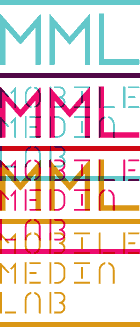02.19
Media Hot and Cold: 1
Added by Sam
Media Hot and Cold: 1
Feb 22, 23, 25, 2010
Faculty of Creative Multimedia,
Artists: Owen Chapman, Mélanie Hogan, Rae Staseson (Feb 22); Samuel Thulin (Feb 23); Mobile Digital Commons Network, Feb 25.
Curator and Creative Director: Kim Sawchuk,
Media Hot and Cold 1.
Media Hot and Cold: 1 presents a sampling of artworks generated by members of Montreal-Toronto’s Mobile Media Lab, a co-located research laboratory exploring and investigating the promise, potential, and rhetoric of mobile, wireless technologies.
Three different campaigns, with three different sets of work, will be presented on a rotating schedule on Feb 22, 23, and 25, 2010.
Monday, Feb 22.
9:30a.m.- 12:00 p.m. Rae Staseson, When Owls Dream
12:01- 2:30 pm. Mél Hogan, 100Vingt
2:31 pm- 4 pm, Owen Chapman, Everyday Law
Tuesday, Feb 23.
Samuel Thulin, From there to hear: placing mobile music
9:30a.m.- 12:00 p.m. Walking
12:01- 2:30 pm. Taking a bus
2:31 pm- 4 pm. Riding the metro
Thursday, Feb 25,
The Haunting: Digital Commons Network (Project Designers, Michael Longford, York University; David McIntosh, OCAD)
9:30- 12: Tomasina Saro
12_01- 2;30: Henry Houdini
2:30-5:00: Arthur Ellis
Media Hot and Cold: the series
Media Hot and Cold is a curatorial project featuring audio and visual art works that created for the small screen and compressed audio formats found on an array of mobile media devices, including the cell phone. The series takes its title from the writings of Canadian media guru Marshall McLuhan, who described media in atmospheric terms as either “hot” or “cold”. The title also plays with the obvious climatic differences between Canada and Malaysia.
Mobile Media Gallery: a gallery-in-a-box
The Media Hot and Cold series is sponsored by the Mobile Media Gallery, Montreal-Toronto, a curatorial crucible hosting exhibitions and initiatives that emphasize ephemeral, itinerant, transitory events that are often location-specific and time-based. We have hosted events in traditional art spaces, such as Hexagram’s ‘blackbox’ and non-traditional neighbourhood locations, such as a local depanneur. Central to many of our projects is the use of a Bluetooth server deployed to deliver content anywhere we can plug in: it is a literal ‘gallery-in-a-box’ that is portable, light, and transmits content wirelessly and for free via Bluetooth. Such devices have minimal transmission range and limited storage capacity and are typically used by corporations for proximity marketing purposes. To access content by Bluetooth users must be within a 10 to 30 foot radius of the server and have their device set to ‘discoverable’.
In homage to the surrealist concept of ‘detournement’ the Mobile Media Gallery have highjacked the server using it to deliver up non-commercial cultural content and commentary, rather than advertising and promotions. For these reasons our exhibitions and events are described as ‘campaigns’. Rather than campaigning for capitalist consumption, the Mobile Media Gallery are embarked on a campaign for art, culture and ideas.
Why Bluetooth?
The advantage of Bluetooth, instead of a cellular phone network or wi-fi is this: Bluetooth allows for file-sharing and communications between mobile devices for free. Users do not pay for data transmission of content, as they do over a regular network. However, content via the server is freely available only if Bluetooth is supported on your mobile device, only if you make your device ‘discoverable’ and accept the content on offer, and only if the memory on your device is large enough to accept the file. Some companies, such as Apple, limit the use of Bluetooth to their products and for this reason users of the iphone cannot access our content.


